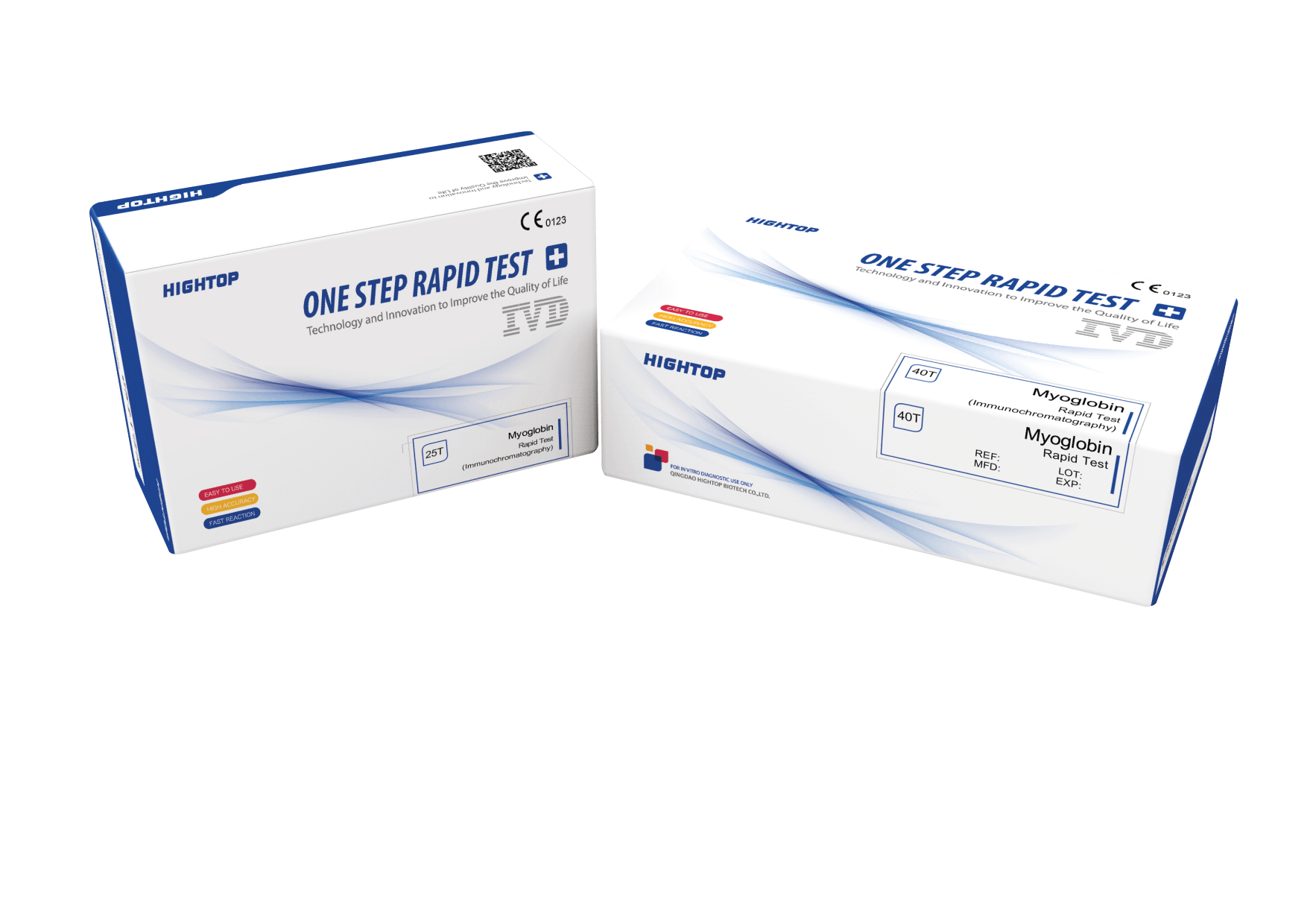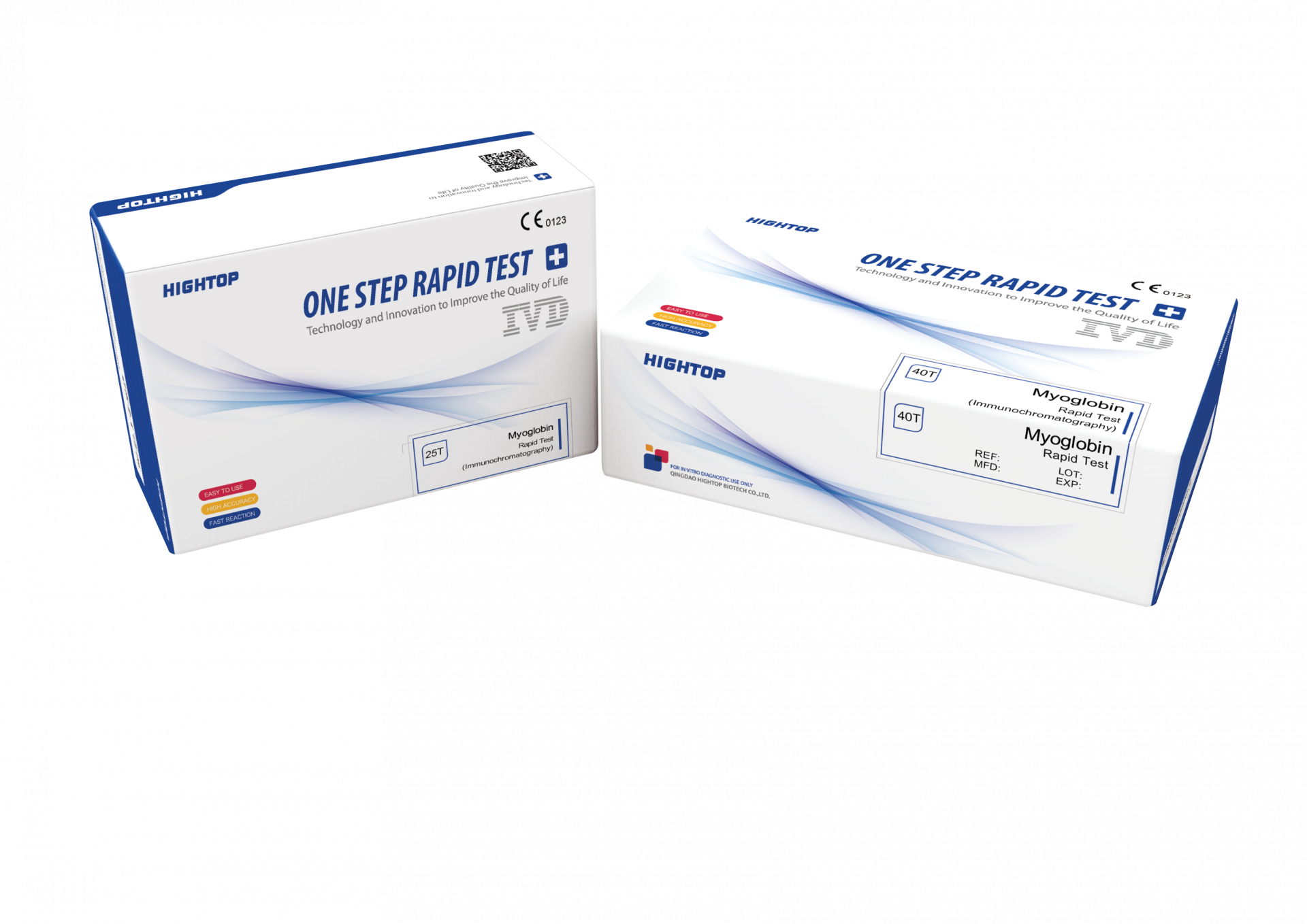Buy Myoglobin Tests
Myoglobin tests at OdemShop are essential for early detection of heart muscle damage. They provide fast and reliable results.
The myoglobin test - All you need to know
The myoglobin test is an important diagnostic tool that can identify various diseases of the heart and muscles. There is a lot to understand about the process, but it is worth taking the time to learn it all.
This article provides a detailed introduction to the myoglobin test and its use in diagnosing cardiovascular disease as well as other health conditions. Readers will also receive information on how to best be prepared for this type of testing and the risks involved.
By analyzing the myoglobin test, potential health problems can be detected and treated early - ultimately helping the patient.
What is a myoglobin test?
A myoglobin test is a diagnostic tool used primarily to identify a heart attack or myocardial infarction. Myoglobin is a protein present in muscles, including the heart muscle, that is released into the blood when damaged. It is one of the first cardiac markers to rise in acute myocardial infarction and may be elevated as early as 1-3 hours after an event.
The rapid myoglobin test allows for immediate diagnosis close to the patient and is an important tool for differentiating between unstable angina and acute myocardial infarction. In angina pectoris, the myoglobin level usually remains normal, whereas it increases in myocardial infarction.
The test itself consists of a test card and uses a chromatographic immunoassay to qualitatively determine human myoglobin in whole blood. An elevated myoglobin level may indicate a heart attack, but should always be interpreted in conjunction with other cardiac markers, such as CK-MB or troponin, as well as the patient's symptoms and other diagnostic tests.
Myoglobin testing plays an important role in clinical practice, especially in patients with chest pain. In combination with derived therapeutic measures, medical professionals can take decisive steps to treat serious conditions such as myocardial infarction, one of the leading causes of death in industrialized nations, based on the test results.
Despite its usefulness, it should be noted that the myoglobin test is not definitive proof of a heart attack. It is a diagnostic tool for a rough assessment of cardiac tissue damage and should not be used as the sole diagnostic tool for interpretations.
Myoglobin Testing Procedure
The myoglobin testing procedure is simple and can usually be performed in a few minutes. It involves drawing blood serum, followed by analysis of the levels using specific tests. Important markers for this testing include myoglobin and troponin, both of which can be signs of potential conditions such as myocardial infarction. A combination of laboratory equipment and staff caregiver expertise ensures that patients receive reliable results. Because of the accuracy and accessibility of the procedure, it has become a useful diagnostic tool.
Myoglobin Test Results
Myoglobin test results can be an important tool for diagnosing various conditions, especially myocardial infarction. The exact values are determined based on the concentration of myoglobin and troponin in the blood serum. The test is quick to perform and accessible, giving patients access to accurate and reliable results. Therefore, it is an effective method to diagnose possible diseases in time.
Why is the test performed?
Myoglobin testing is most commonly performed in patients suffering from acute myocardial infarction. Statistics show that the test is more than twice as fast as troponin within hours of the onset of the infarction.
Therefore, it is often used as an early warning of possible heart damage and can help to better understand the patient's condition. The myoglobin test is also used to diagnose other diseases or conditions that may be associated with muscle pain.
Because of its ability to identify disease symptoms early, the test has gained importance in clinics worldwide. With this knowledge, treatment plans can be developed and specific actions taken to prevent secondary damage and speed the healing process.
Thus, by knowing the benefits of the test, one can act more effectively to minimize serious consequences for the patient. Next, we will now examine in more detail how the test is performed.
How is the test performed?
The myoglobin test is mainly performed by obtaining urine and a blood sample. It can also be used for qualitative detection of myoglobin in blood.
The test is often recommended for people suspected of having a heart attack or other cardiac diseases, especially when combined with a troponin test. If the myoglobin test shows elevated levels, further diagnostic procedures should be suggested to better determine the condition.
The urine myoglobin test is particularly useful as a screening tool due to its rapid and accurate nature. It can help detect heart disease in asymptomatic patients as well.
Given these advantages, the urine myoglobin test has gained widespread use, providing early diagnosis and treatment options. It helps identify at-risk patients and enables appropriate treatment, ultimately reducing the risk of serious complications. This makes it an essential part of prevention strategies for those at high risk of coronary heart disease.
Due to its accuracy, the myoglobin test is a common method for identifying signs of serious health problems, allowing for early detection of conditions like myocardial infarction or angina pectoris, and facilitating timely treatment decisions. It plays a crucial role in improving outcomes for affected individuals.
What are the normal values?
The myoglobin test measures the level of muscle protein in the blood to determine complications of a heart attack or other conditions, including troponin, angina pectoris, and myocardial infarction.
Normally, the levels should be as follows:
- Albumin: 0 to 2 mg/dL
- Myoglobin: 0 to 140 ng/mL
- Hemoglobin: 7.5% - 15%
- CK (creatine kinase): 5 to 200 U/L
These values may vary depending on factors such as age, sex, race, diet, activity level, and disease symptoms. It is important to consult a doctor to determine the normal values for each individual. Considering all presenting symptoms is crucial to ensure accurate diagnosis and appropriate treatment.
The myoglobin test is highly accurate, making it a valuable tool for early detection of diseases such as myocardial infarction or angina pectoris, ultimately benefiting the lives of those affected.
What diseases can be diagnosed with the test?
The myoglobin test is used to diagnose myoglobin deficiency and detect heart failure by measuring the concentration of myoglobin in the blood serum.
Myoglobin deficiency: The myoglobin test is useful in detecting myoglobin deficiency, where the concentration of myoglobin in the blood is significantly reduced. This deficiency is typically used as an indicator of heart muscle diseases, especially myocardial infarction and other heart conditions. Regular examinations are crucial to identify and treat such pathologies at an early stage.
Heart failure: The myoglobin test can also diagnose heart failure, which refers to a decrease in the heart's functioning and its ability to effectively pump blood. Rapid tests or certain cardiac markers such as troponin T or I are recommended to differentiate this condition. These tests enable quick diagnosis and initiation of appropriate treatment.
How can elevated myoglobin levels be treated?
Elevated myoglobin levels can indicate unstable angina or perioperative myocardial infarction. In such cases, it is important for patients experiencing these symptoms to seek immediate medical attention.
Typically, the doctor will order blood tests to check the levels of myoglobin and troponin in the body. If both values are elevated, there is a higher likelihood of acute myocardial infarction, requiring urgent medical attention. The treatment plan depends on the extent of damage, but it usually involves absolute rest and medications to reduce inflammation and lower blood pressure, facilitating the healing process.
If no serious illness is diagnosed, routine blood tests may be recommended to monitor changes in myoglobin levels and identify potential health problems early.
Optimal therapy requires determining myoglobin levels, making it an essential step. To purchase myoglobin tests wholesale or from specialty stores, consider reputable providers like OdemShop. They offer high-quality tests, a wide selection, competitive prices, and excellent customer service.
Conclusion
Myoglobin testing is an important diagnostic method for identifying certain diseases. By understanding test availability, turnaround time for results, and risk factors that may necessitate the test, the cost and side effects can be minimized. Advancements in technology enable remote access to the knowledge provided by the myoglobin test, improving its accessibility.
The myoglobin test offers a range of potentially life-saving benefits, and everyone should be aware of this option. It serves as a practical and effective means of identifying diseases like myocardial infarction or angina pectoris at an early stage, resulting in better outcomes for patients.
Here are more cardiovascular tests:
FAQ
What is a myoglobin test?
A diagnostic test that measures the level of myoglobin in the blood is known as a myoglobin test. Myoglobin is a protein found in muscles that is released during injury, trauma, or inflammation. A high level of myoglobin in the blood may indicate damage to muscle cells.
What is a myoglobin test used for?
A myoglobin test is used to diagnose muscle damage, especially if a heart attack or rhabdomyolysis (a rare condition in which muscle cells are destroyed and myoglobin is released into the blood) is suspected.
How is a myoglobin test performed?
A myoglobin test is performed by taking a blood sample. The blood is then tested in the laboratory for myoglobin levels.
Is a myoglobin test painful?
Taking blood for a myoglobin test is similar to other blood tests and can be slightly uncomfortable, but usually not painful.
What is the preparation procedure for a myoglobin test?
No special preparation is needed to perform a myoglobin test. However, it is important to tell the doctor about any medications you are taking, as certain medications can affect myoglobin levels.
How long does it take to get the results of a myoglobin test?
The results of a myoglobin test can usually be obtained within 24 to 48 hours after the blood is drawn.
Elevated levels of myoglobin in the blood indicate what?
High levels of myoglobin in the blood may indicate muscle injury, rhabdomyolysis, or a heart attack.
What is the significance of low myoglobin levels in the blood?
Low blood myoglobin levels are normal and indicate that there is no muscle injury or rhabdomyolysis.
Are there any risks or complications with a myoglobin test?
Blood collection for a myoglobin test is a relatively simple and safe procedure that usually does not involve any risks or complications.
Can a myoglobin test be done at home?
No, a myoglobin test requires a blood draw, which should only be performed by healthcare professionals.

Myoglobin – A Comprehensive Guide to the Role of Protein in the Body
Myoglobin is a single-chain protein found in heart and skeletal muscle cells. When muscle is damaged, such as a heart attack, myoglobin can be released from the muscle...
View post

